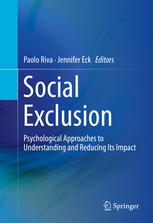

Most ebook files are in PDF format, so you can easily read them using various software such as Foxit Reader or directly on the Google Chrome browser.
Some ebook files are released by publishers in other formats such as .awz, .mobi, .epub, .fb2, etc. You may need to install specific software to read these formats on mobile/PC, such as Calibre.
Please read the tutorial at this link: https://ebookbell.com/faq
We offer FREE conversion to the popular formats you request; however, this may take some time. Therefore, right after payment, please email us, and we will try to provide the service as quickly as possible.
For some exceptional file formats or broken links (if any), please refrain from opening any disputes. Instead, email us first, and we will try to assist within a maximum of 6 hours.
EbookBell Team

4.0
66 reviewsFrom ostracism on the playground to romantic rejection, bullying at work, and social disregard for the aged, individuals are at constant risk of experiencing instances of social exclusion, including ostracism, rejection, dehumanization, and discrimination. These phenomena have a powerful impact as testified by their immediate influence on people’s thoughts, emotions, and behaviors. Social Exclusion: Psychological Approaches to Understanding and Reducing Its Impact investigates different psychological approaches, across multiple psychological subdisciplines, to understanding the causes and consequences of social exclusion and possible ways to reduce or buffer against its negative effects.
The purpose of this volume is threefold. First, it lays the groundwork for the understanding of social exclusion research; reviewing the different instances of social exclusion in everyday life and methods to experimentally investigate them. Second, this volume brings together different psychological approaches to the topic of social exclusion. Leading scholars from around the world contribute perspectives from social psychology, social neuroscience, developmental psychology, educational psychology, work and organizational psychology, clinical psychology, and social gerontology to provide a comprehensive overview of social exclusion research in different psychological subdisciplines. Taken together, these chapters are conducive to the important development of new and more integrative research models on social exclusion. Finally, this volume discusses psychological strategies such as emotion regulation, psychological resources, and brain mechanisms that can reduce or buffer against the negative consequences of social exclusion. From school shootings to domestic violence, from cognitive impairment to suicide attempts, the negative impact of social exclusion has been widely documented. Thus, from an applied perspective, knowing potential ways to mitigate the negative effects of social exclusion can have a significant positive influence on people’s—and society’s—well-being. Overall, this book provides the reader with the knowledge to understand the impact of social exclusion and with tools to address it across many different contexts. Importantly, Social Exclusion: Psychological Approaches to Understanding and Reducing Its Impact aims to bridge the gap between the approaches of different psychological subdisciplines to this topic, working towards a comprehensive, integrative model of social exclusion.